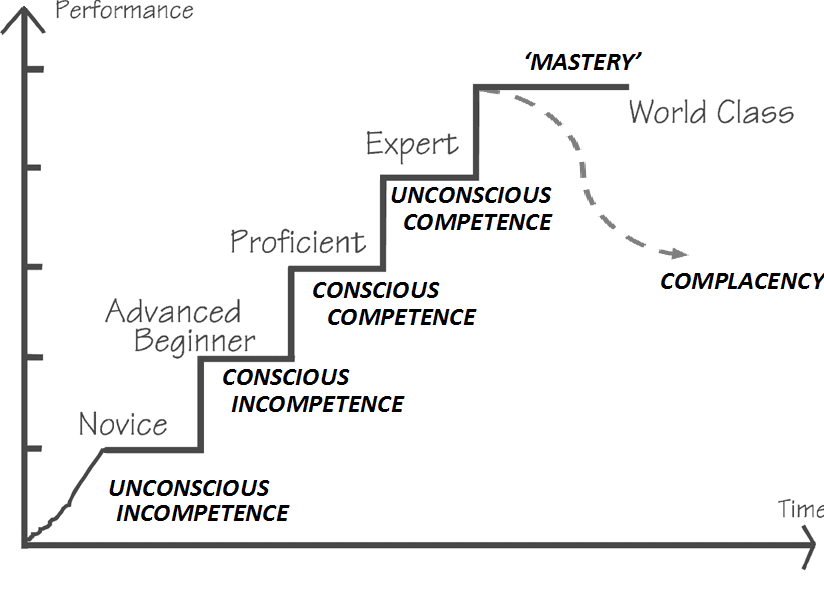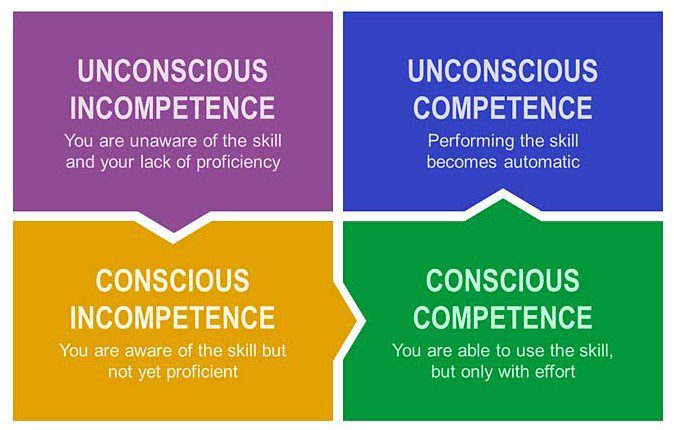In 1969, Management trainer Martin M. Broadwell, describes the Four stages of competence in a Gospel Guardian article titled: the four levels of teaching, he writes:
A few are gifted with the ability to teach well without working at it. Others must learn the skill. For most of us, learning how to teach means studying and practicing and seeing what we did right and wrong. According to Broadwell there are four levels of teaching:
Unconscious Incompetent.
This poor creature who is a very poor teacher, but doesn’t know it. He goes on in the same old way, perhaps lecturing in a dull, monotone manner, unaware that he is wasting his time and the students’. We can do nothing towards improving this fellow, because he can’t be changed until he reaches the next level, which is the “Conscious Incompetent.”
Unconscious Incompetent: You are unaware of the skill and your lack of proficiency
Conscious Incompetent
Now we have a fellow that is bad, but fortunately, knows he is bad. He is looking for help, and the chances are pretty good that he will find a way to improve his methods. He is willing to try something new; he is willing to admit that maybe he isn’t getting through to his students. We can work with him because he wants to become better. If we can show him the tools of the trade, he will start getting results, and he will know why. This means he now has been raised to the third level, the “Conscious Competent.”
Conscious Incompetent : You are aware of the skill but not yet proficient
Conscious Competent.
This person is a good teacher and knows why. He knows what will work and what won’t for him. He has experimented, changed, measured, reviewed and constantly looked for more and better ideas. This fellow knows his capabilities and his limitations. He knows about teaching. He probably would make a good teacher trainer.
Conscious Competent: Performing the skill becomes automatic
Unconscious Competent.
There is a final level, though, and it is one that gives us a hard time, because he is the fellow that is a good teacher by nature. Somehow he just always does the right thing, says the right thing, and gets the right results. The trouble is, he doesn’t know why he does what he does. He is in the small class of people we will call the “Unconscious Competent.”
He’s good, but he doesn’t know what it is that makes him good. The one teaching assignment that he would probably fail at would be in trying to teach others how to teach. The only bad thing about having these kinds of people around is that it leads folks to say, “Well, good teachers are born, not made. You either have it or you don’t.” If we haven’t accomplished anything else in this series, I hope we have proven that such a statement as this one is very, very untrue.
Unconscious Competent: You are able to use the skill, but only with effort

Unconscious Incompetence
- You are unaware of the skill and your lack of proficiency
Unconscious Incompetence
- You are aware of the skill but not yet proficient
Unconscious Competence
- Performing the skill becomes automatic
Conscious Competences
- You are able to use the skill, but only with effort
In his book, A Complaint Free World, Will Bowen explains the four stages of competence through complaining:
- Unconscious Incompetence
Just as a fish may not even be aware of the water that surrounds it, you may not be aware of all of the complaints you hear and speak. Complaining is so much a part of who we are, it’s difficult to recognize what is and is not a complaint.
2. Conscious Incompetence
Moving into the Conscious Incompetence stage means becoming uncomfortably aware of just how often you complain. You begin to catch yourself complaining but only after the fact, and you can’t seem to stop. You repeatedly switch your bracelet, but your complaints don’t seem to be diminishing. I’ve heard some refer to this as the “Stop me before I complain again” stage
3 Conscious Competence
When you find yourself around other people who are complaining and you catch yourself feeling compelled to chime in, breathe. When something frustrating happens and you have the chance to unload your frustrations on someone else, breathe.
4. Unconscious Competence
In the Unconscious Competence stage you are no longer an “ouch” looking for a hurt. Rather, your thoughts are now on what you want, and you are beginning to notice how what you desire manifests. Not only are you happier, but also the people around you seem happier. You are attracting upbeat people, and your positive nature is inspiring those around you to even higher mental and emotional levels.
All the best in your quest to get better. Don’t Settle: Live with Passion.



Comments are closed.